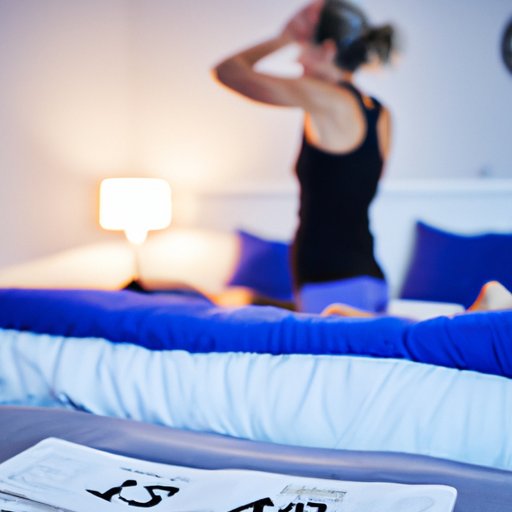Introduction
Exercising before bed is an activity that many people are unsure of. While some swear by its benefits, others worry that it could potentially disrupt their sleep or cause other issues. To understand if it’s okay to exercise before bed, it’s important to consider the pros and cons of doing so, as well as how to make it work for you.
Examining the Pros and Cons of Exercising Before Bed
When it comes to exercising before bed, there are both benefits and potential drawbacks. It’s important to weigh both sides carefully to determine if this type of exercise is right for you.
Benefits of Exercising Before Bed
One of the biggest benefits of exercising before bed is improved quality of sleep. Exercise can help to tire out your body and mind, making it easier to fall asleep quickly. Additionally, exercise can help to reduce stress levels, leading to a more restful sleep. Regular exercise can also help to improve overall mental health and physical performance.
Potential Drawbacks to Exercising Before Bed
While there are many benefits to exercising before bed, it’s important to be aware of the potential drawbacks as well. If done too close to bedtime, it can actually have the opposite effect and make it difficult to fall asleep. Additionally, if the intensity of the exercise is too high, it can lead to increased heart rate and body temperature, which can make it harder to sleep.

How to Make Exercise Before Bed Work for You
If you decide that exercising before bed is something that you would like to try, there are a few things that you should keep in mind. Here are some tips on how to make exercise before bed work for you.
Ways to Incorporate Exercise into Your Evening Routine
The best way to incorporate exercise into your evening routine is to set a specific time to do it. This will help to ensure that you’re not exercising too close to bedtime. Additionally, it’s important to choose the right type of exercise for your needs. Low-impact activities such as yoga and stretching can be great options if you want to avoid getting too worked up before bed.
Tips on How to Maximize the Benefits of Working Out Before Bed
In order to maximize the benefits of working out before bed, it’s important to pay attention to timing, intensity level, and duration. Aim to finish your workout at least two hours before bedtime, and stick to low-intensity exercises such as walking, yoga, or stretching. Additionally, keep your workout to no more than 30 minutes in order to avoid overstimulating your body.

Exploring the Benefits of Working Out Before Bed
There are numerous benefits to exercising before bed, including improved quality of sleep, better mental health, and improved physical performance. Let’s take a closer look at each of these benefits.
Improved Quality of Sleep
Exercising before bed can help to improve the quality of your sleep. When you exercise, your body releases endorphins, which can help to relax your body and mind. Additionally, regular exercise can help to regulate your circadian rhythm, which can lead to better sleep quality.
Better Mental Health
Regular exercise can also have a positive effect on your mental health. Exercise can help to reduce stress, anxiety, and depression, as well as increase self-confidence. Additionally, it can help to boost your mood and energy levels, allowing you to feel more alert throughout the day.
Improved Physical Performance
Exercising before bed can also help to improve your physical performance. Regular exercise can help to strengthen your muscles and bones, improve your balance and coordination, and increase your endurance and stamina. All of these benefits can help to make you stronger and more capable of performing everyday tasks.
What You Should Know About Working Out Before Bed
When it comes to working out before bed, there are a few things that you should keep in mind. Here are some tips on how to make sure that you’re getting the most out of your workout.
Timing of Exercise
It’s important to pay attention to the timing of your workout. Aim to finish your workout at least two hours before bedtime. This will give your body time to cool down and relax before you go to sleep.
Intensity Level
The intensity level of your workout is also important. Stick to low-intensity exercises such as walking, yoga, or stretching. Avoid any high-intensity exercises that may get your heart rate and body temperature too high.
Duration
Finally, it’s important to keep the duration of your workout to no more than 30 minutes. This will help to ensure that you don’t overstimulate your body before bed.
Tips on How to Incorporate Exercise into Your Evening Routine
In order to make exercise before bed work for you, it’s important to set a schedule and stick to it. Here are some tips on how to do that.
Setting a Schedule
It’s important to set a specific time each day to do your workout. This will help to ensure that you’re not exercising too close to bedtime. Additionally, it will help to create a sense of consistency, making it easier to stick to your routine.
Choosing the Right Type of Exercise
When choosing the type of exercise that you’ll do, it’s important to pick something that you enjoy. This will make it easier to stay motivated and stick to your routine. Low-impact activities such as yoga and stretching can be great options if you want to avoid getting too worked up before bed.
Sticking to the Plan
Once you’ve set a schedule and chosen the type of exercise that you’ll do, it’s important to stick to the plan. Try to make your workouts part of your daily routine so that they become second nature. This will make it easier to maintain a consistent exercise routine.

The Impact of Exercise on Sleep Quality
Exercise can have a positive impact on sleep quality, but it is important to strike a balance between exercise and sleep. Here’s what you need to know about the effects of exercise on sleep quality and how to achieve an optimal balance.
Effects of Exercise on Sleep Quality
Regular exercise can help to improve the quality of your sleep. Exercise can help to reduce stress and anxiety, and can help to regulate your circadian rhythm. Additionally, it can help to tire out your body and mind, making it easier to fall asleep quickly.
Ways to Achieve an Optimal Balance between Exercise and Sleep
In order to achieve an optimal balance between exercise and sleep, it’s important to pay attention to the timing of your workouts, the intensity level, and the duration. Aim to finish your workout at least two hours before bedtime, and stick to low-intensity exercises such as walking, yoga, or stretching. Additionally, keep your workout to no more than 30 minutes in order to avoid overstimulating your body.

Uncovering the Myths and Facts Around Exercising Before Bed
When it comes to exercising before bed, there are a number of myths and facts that you should be aware of. Here’s a look at some common myths and facts about exercising before bed.
Common Myths about Exercising Before Bed
Many people believe that exercising before bed will interfere with their sleep. However, this is not necessarily true. As long as you pay attention to the timing, intensity level, and duration of your workout, exercise can actually improve the quality of your sleep.
Facts about Exercising Before Bed
Regular exercise can help to improve sleep quality, reduce stress and anxiety, and enhance overall mental and physical health. Additionally, it can help to regulate your circadian rhythm, which can lead to better sleep quality. Finally, low-impact exercises such as yoga and stretching can be great options for exercising before bed.
Conclusion
Exercising before bed can have both benefits and potential drawbacks. It’s important to weigh both sides carefully in order to determine if this type of exercise is right for you. When done correctly, exercising before bed can help to improve sleep quality, reduce stress and anxiety, and enhance overall mental and physical health. Additionally, it can help to regulate your circadian rhythm, which can lead to better sleep quality. With the right approach, you can make exercise before bed work for you.
(Note: Is this article not meeting your expectations? Do you have knowledge or insights to share? Unlock new opportunities and expand your reach by joining our authors team. Click Registration to join us and share your expertise with our readers.)
